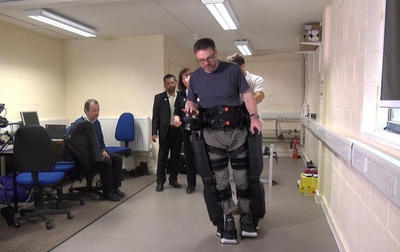Clinical Trials of Robotic Legs Help Patients Walk Again
Author: University of Kent
Published: 2016/05/26
Category Topic: Clinical Trials - Related Publications
Page Content: Synopsis - Introduction - Main
Synopsis: Clinicians and engineers at University of Kent carrying out first clinical trials of robotic legs for patients.
Introduction
This University of Kent trial is open to all residents of UK and Ireland.
These legs are the only design available that allow people to move about 'hands-free'. This means they can use their hands for the activities of daily life, like making a cup of tea while upright. The Kent study in the School of Engineering and Digital Arts (EDA), will examine the impact of these simple freedoms on the patient, both physically and mentally.
Main Content
The device lifts patients from a sitting position into a robot-supported standing position, allowing them to take part in a set of supported walking and stretching exercises, designed by specialist physiotherapists. There are increasing numbers of wheelchair users who cannot walk at all and sitting for extended periods places them at risk from numerous medical complications. Walking in the robotic legs may help reduce these risks as well as improve quality of life.
If the trial finds these 'exoskeletons' work, they could improve the health of patients with a variety of causes of paralysis - including people who have suffered a trauma from an accident, war injuries, strokes, multiple sclerosis or motor neurone disease.
The University of Kent is uniquely placed for researchers in engineering, biomedical engineering, medicine and psychology to collaborate with doctors and patients in these first clinical UK trials of 'bionic' legs - first developed by the United States Army for military personnel who lost limbs.
For the bionic legs to have wider use, the manufacturers need clinical trials with a variety of patients to find out if it is successful every time because people with paralysis in rehabilitation cannot risk falling, and to find out if it is effective in enhancing their quality of life.
The clinical trial is led by Dr Mohamed Sakel, Honorary Senior Research fellow at the University's School of Engineering and Digital Arts (EDA) and Director/Consultant Neuro-Rehabilitation and former Director R&D at the East Kent Hospitals University Foundation Trust (EKHUFT), and Dr Matthew Pepper, Senior Lecturer in Electronics, EDA, and Consultant Clinical Scientist in the Medical Physics Department, EKHUFT.
EDA and EKHUFT have worked collaboratively on a number of assistive technology projects that have placed them with exactly the right skills and track-record to develop the robotic walking device using robotic legs developed by New Zealand manufacturer, Rex Bionics.

The research is supported by the National Institute for Health Research (NIHR) Clinical Research Network (CRN): Kent, Surrey and Sussex and is being funded by REX Bionics.
The University of Kent plans to further develop the device to increase ease of use and reduce cost.
This University of Kent trial is open to all residents of UK and Ireland.